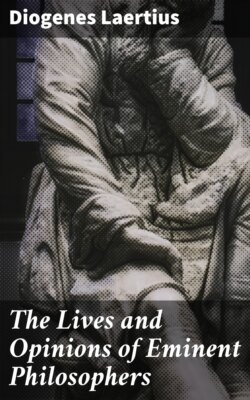Читать книгу The Lives and Opinions of Eminent Philosophers - Diogenes Laertius - Страница 50
На сайте Литреса книга снята с продажи.
ОглавлениеBut I do care for none of all these triflers,
Nor for any one else; not for your Phædon,
Whoever he may be; not for the quarrelsome
Euclides, who bit all the Megareans
With love of fierce contention.
III. He wrote six dialogues—the Lamprias, the Æschines, the Phœnix, the Crito, the Alcibiades, and the Amatory dialogue.
IV. Next in succession to Euclides, came Eubulides of Miletus, who handed down a great many arguments in dialectics; such as the Lying one; the Concealed one; the Electra; the Veiled one; the Sorites; the Horned one; the Bald one.[26] And one of the Comic poets speaks of him in the following terms:—
Eubulides, that most contentious sophist,
Asking his horned quibbles, and perplexing
The natives with his false arrogant speeches,
Has gone with all the fluency of Demosthenes.
For it seems that Demosthenes had been his pupil, and that being at first unable to pronounce the R, he got rid of that defect. Eubulides had a quarrel with Aristotle, and was constantly attacking him.
V. Among the different people who succeeded Eubulides, was Alexinus of Elis, a man very fond of argument, on which account he was nicknamed Ἐλέγξινος.[27] He had an especial quarrel with Zeno; and Hermippus relates of him that he went from Elis to Olympia, and studied philosophy there; and that when his pupils asked him why he lived there, he said that he wished to establish a school which should be called the Olympic school; but that his pupils being in distress, through want of means of support, and finding the situation unhealthy for them, left him; and that after that Alexinus lived by himself, with only one servant. And after that, when swimming in the Alpheus, he was pricked by a reed, and the injury proved fatal, and he died. And we have written an epigram on him which runs thus:—
Then the report, alas! was true,
That an unhappy man,
While swimming tore his foot against a nail
For the illustrious sage,
Good Alexinus, swimming in the Alpheus,
Died from a hostile reed.
And he wrote not only against Zeno, but he composed other works also, especially one against Ephorus the historian.
VI. One of the school of Eubulides was Euphantus of Olynthus, who wrote a history of the events of his own time; he also composed several tragedies, for which he got great distinction at the festivals. And he was the preceptor of Antigonus, the king to whom he dedicated a treatise on Monarchy, which had an exceedingly high reputation. And at last he died of old age.
VII. There are also other pupils of Eubulides, among whom is Apollonius Cronus, who was the preceptor of Diodorus of Iasos, the son of Aminias; and he too was surnamed Cronus, and is thus mentioned by Callimachus in his epigrams:—
Momus himself did carve upon the walls,
Cronus is wise.
And he was a dialectician, and, as some believe, he was the first person who invented the Concealed argument, and the Horned one. When he was staying at the court of Ptolemy Soter, he had several dialectic questions put to him by Stilpo; and as he was not able to solve them at the moment, he was reproached by the king with many hard words, and among other things, he was nicknamed Cronus, out of derision. So he left the banquet, and wrote an essay on the question of Stilpo, and then died of despondency. And we have written the following epigram on him:—
O Diodorus Cronus, what sad fate
Buried you in despair?
So that you hastened to the shades below,
Perplexed by Stilpo’s quibbles—
You would deserve your name of Cronus[28] better,
If C and r were gone.
VIII. One of the successors of Euclides was Icthyas, the son of Metellus, a man of great eminence, to whom Diogenes the Cynic addressed a dialogue. And Clinomachus of Thurii, who was the first person who ever wrote about axioms and categorems, and things of that kind. And Stilpo the Megarian, a most illustrious philosopher, whom we must now speak of.
